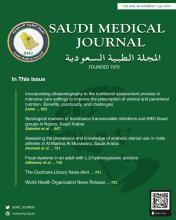To the Editor
Equity in health care received plenty of coverage recently; Alotaibi’s editorial on building a healthy future for all in Saudi Medical Journal (May 2024) was followed by a perspective on health care equity in the New England Journal of Medicine (16 May) and a short review on how to deliver equitable access to the best possible care in the British Medical Journal (25 May).1-3 Health is a fundamental human right and every human being must have a fair and equal opportunity to attain optimal level of health.4 There is significant health inequities between countries. A child born in Japan is expected to live to an age of 84, while a child born in Lesotho in southern Africa is only expected to live just above 50. Ninety nine percent of the world’s maternal death occurs in developing countries.5
In the United Kingdom (UK), the National Health Service (NHS) was set up in 1948 to provide health care to all, free at the point of use. Though there is equality in health provision, there are disparities within individual cities. In Glasgow life expectancy in men varies from just over 66 in less advantaged areas of the city, to nearly 82 years in more prosperous parts.5 In August 1980, the United Kingdom government published the Report of the Working Group on Inequalities in Health, also known as the Black Report (after chair person, Sir Douglas Black, President of the Royal College of Physicians). The Report showed in great detail the extent of which poor health and early death are unequally distributed among the population of the UK, and suggested that these inequalities have been widening rather than diminishing since the establishment of the NHS.6 However, the report concluded that these inequalities were not mainly attributable to failings in the NHS, but rather to many other socioeconomic inequalities influencing health: diet, education, employment, housing, income and conditions of work (Figure 1). In essence, the outcome of any illness in a person with a low income is less favorable, even if the care received is the same in someone with a high income. Though the Report recommended a wide strategy of social policy measures to combat inequalities, the government at the time took no notice of its findings and they did not even print enough copies of the report. The findings of the Black Report show the importance addressing socioeconomic inequalities in all aspects of life.
- Factors influencing health.
Though health of the nation in the UK and in most developed countries showed improvement in the first decade of the 21st century, the standard began to decline following the global financial crisis in 2007-8 with introduction of austerity measures, followed by the COVID-19 pandemic in 2020 and energy crisis following the war in Europe in 2022.7
The fact remains that people with higher socioeconomic status in society have better health and more opportunities leading to a flourishing life. Education is key in raising the social status of the individual. Education and health go hand in hand.
Another factor in reducing efficiency of NHS hospitals is delay in discharging physically and mentally disabled mostly elderly patients, deemed medically fit to be discharged back to the community because of constrained in out-of-hospital care. This trend needs to be reversed to relieve pressure on Emergency Medicine Departments and reduce waiting lists. In addition, there are unnecessary risks to those patients overstaying in hospital. Though there is social care, but unlike health care, it is not entirely free at the point of use. In England, it is only available to people with the highest needs and lowest assets. Those who have assets more than £23,250, are expected to contribute towards residential care.7
Planning for effective and efficient adult social care plan is vital in edging towards achieving equity in health.
- Copyright: © Saudi Medical Journal
This is an Open Access journal and articles published are distributed under the terms of the Creative Commons Attribution-NonCommercial License (CC BY-NC). Readers may copy, distribute, and display the work for non-commercial purposes with the proper citation of the original work.







